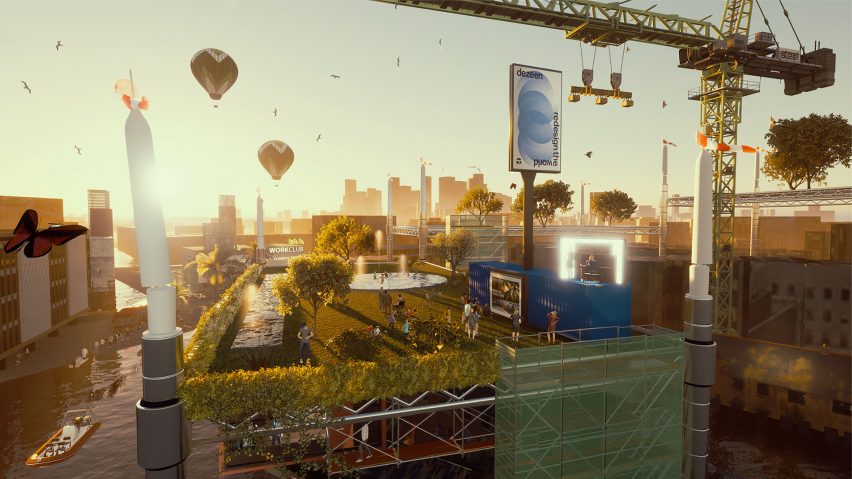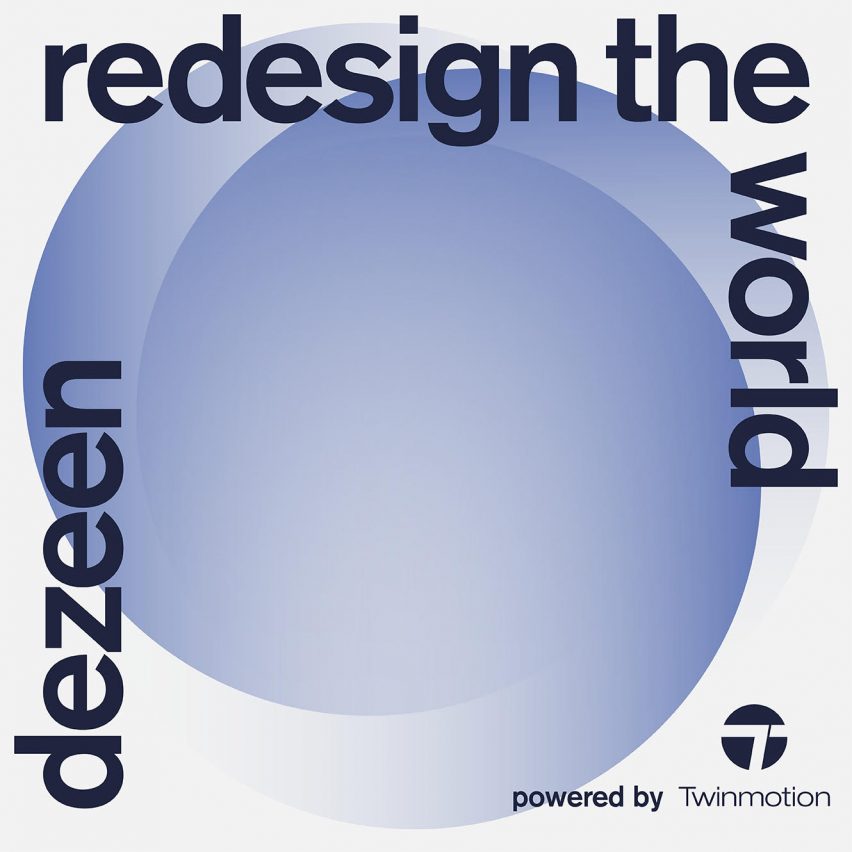Oliver Salway calls for people to "redesign their lives" instead of redesigning the planet
A short film by Oliver Salway that imagines a future where humanity has chosen to embrace a simpler existence to avert climate catastrophe has been highly commended by the judges of Dezeen's Redesign the World competition powered by Twinmotion.
Salway's film, which was generated using architectural visualisation tool Twinmotion and then cut together using video editing software, is titled Redesigning Our Lives.
In it, Salway imagines a future where people idolise eco-warriors instead of social media influencers, cut out long-distance travel and build simpler structures using materials such as wood and ceramics instead of concrete and steel.
Salway's competition entry "unlike any other"
The entry is a finalist in the Redesign the World competition. Although it narrowly missed out on a place in the top three, the Redesign the World judges commended the film highly for its originality.
"Salway's submission was unlike any other," the judges said. "He turned the competition brief on its head with a film that calls for humans to redesign the way they live rather than trying to redesign the planet."
"Despite diverging from the brief, the judges felt it was an important and well-expressed sentiment. They wish to commend it highly for taking a different approach."
Read more about the proposal below.

Redesigning Our Lives
Oliver Salway
London, UK
Highly commended finalist
"Set in a future flooded corner of the Isle of Dogs, Redesigning Our Lives explores the changes required to our patterns of behaviour and urban planning in response to the climate emergency. The major infrastructural changes required to decarbonise may take decades to come into full effect, but the fastest thing we can change is our minds. Ask not what your planet can do for you, but what you can do for your planet.
"Our home planet is changing. But rather than relying on 'technofixes' to the climate emergency, maybe we're the ones that need 'redesigning'. By reimagining our dreams and our priorities, we can adapt to live within the world's means.
"In the home, a shrine to the planet, like a Japanese kamidana, takes pride of place. And maybe for the next generation — whose heroines are eco-warriors, not influencers — keeping track of the state of the earth via a holographic 'Fitbit for the planet' might prove more compelling than watching cartoons on TV.
"A key adaptation is to rid ourselves of the daily commute. But to avoid the isolation of working from home, maybe we take a short walk, bus or cycle ride to a local 'work club', where we can flexibly choose, day-by-day, which of our varied skills we want to offer to crowd-sourcing employers. Today you could do some anonymous data-processing, but maybe tomorrow you'll sell your embroidery skills.
"It's clear that there isn't any carbon budget for expressionistic architecture left. So we must just build simpler, with timber and advanced ceramics. But for those missing an outlet for all that architectural creativity, there's always the potential that we could add decoration through augmented reality skins, overlaid on the simple shed-like buildings... if we must.
"Increasing density in urban areas offers the potential to stack up land uses, allowing for agriculture that doesn't rely on long-distance supply chains.
"And we can distribute clean power generation, such as vortex resonant wind-generating masts, throughout the city, since they have a lower spatial impact and don't threaten wildlife.
"And learning from ancient desert cities like Yazd in Iran, bolting wind towers onto existing buildings could eliminate the need for energy-intensive air conditioning in our warming world.
"Perhaps to make up for land losses to rising tides, we might need some form of mega-structural intervention, like giant adjustable shelving, which could provide replacement areas for farming and recreation, as well as offering some shelter from the burning sun and heavy rains to the legacy city below. Maybe the ground level citizens profit from the 'air rights'. Penthouse living for all.
"And by redesigning our lives, we might finally find a simpler existence we actually prefer."
The film was written, directed, designed, rendered and edited by Oliver Salway, founder of architecture and design studio Softroom. Artist Adrian Taylor performed the narration, while the eco-warrior drawings were created by sisters Annabelle, Rose and Lavender Froggatt, together with their cousin Daisy Forney.

Redesign the World
Redesign the World is the ultimate design competition, which called for new ideas to rethink planet Earth to ensure that it remains habitable long into the future.
Launched in partnership with Epic Games, the contest asked entrants to visualise their concepts using architectural visualisation software Twinmotion.
The contest received over 100 entries from more than 30 different countries around the world.
These were assessed by a judging panel comprising White Arkitekter CEO Alexandra Hagen, structural engineer Hanif Kara, speculative architect Liam Young, Twinmotion product marketing manager Belinda Ercan and Dezeen founder and editor-in-chief Marcus Fairs, which selected 15 proposals as finalists to be published on Dezeen.
We are unveiling one finalist a day throughout our Dezeen 15 festival, culminating in the winner being announced on 19 November.
The winner will receive the top prize of £5,000. There are also prizes of £2,500 for second place, £1,000 for third place and £500 each for the remaining finalists.
Find out more about Redesign the World ›
See all the finalists revealed so far ›